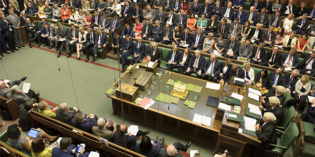
Voters are crying out for better information about elections – here’s your opportunity to help
Voters in the UK need more information about elections and candidates, particularly for local elections. Joe Mitchell, a director at Democracy Club, invites you to come and help provide it for them.

This government has already lost the confidence of the House of Commons: the response should be to replace the government, not to neuter parliament
The government and Parliament cannot agree how to proceed with Brexit. For some, the solution is for the government to prorogue Parliament and implement its Withdrawal Agreement without the confidence of the Commons. David Howarth argues that given the Fixed Term Parliament Act means a general election will not necessarily follow from such a loss of confidence, a new government formed by MPs from across the Commons is a viable option.

Book Review | Conservative Moments: Reading Conservative Texts edited by Mark Garnett
In Conservative Moments: Reading Conservative Texts, Mark Garnett brings together essays that reflect on a plethora of figures across the past two millennia of conservatism, including Edmund Burke, David Hume, Alexander Hamilton, Mustafa Kemal Atatürk and Margaret Thatcher. The book presents a condensed yet detailed account of conservative thought, writes Benjamin Law, that will leave readers with valuable nuggets of information and questions to ponder.

How not to recruit postal voters in the UK
Joshua Townsley and Stuart Turnbull-Dugarte tested the ability of parties to recruit postal voters in a field experiment carried out during the 2018 local elections in London. The result? Sending personal letters persuading voters to become postal voters is not an effective recruitment technique.

A tale of two failures: poor choices and bad judgements on the road to Brexit
How did we get where we are on Brexit? Many major political events are shaped by institutions and long-term social changes, but the political choices of leaders matter too. Ben Worthy assesses how the short-term decisions of David Cameron and Theresa May have led to this avoidable Brexit mess.

Political knowledge and populist attitudes influence voter preferences for government formation
Government formation in multiparty systems requires election losers to concede victory to the winners and, more often than not, winners to compromise to form a coalition government. Why will some voters concede victory to the winning party but others won’t? And what influences their openness to other parties during coalition talks? Looking at evidence from Austria, a multiparty system at the heart of Europe, Carolina Plescia and Jakob-Moritz Eberl find that, even after controlling for party preferences and ideology, political knowledge and populist attitudes are essential in explaining voters’ willingness or unwillingness to accept these fundamental prerequisites of coalition bargaining and political compromise.

The US Congress understands the importance of Special Forces oversight, why doesn’t the UK Parliament?
The US Congress has recently ordered a review of the country’s special operations forces – something that the UK Parliament is unable to do. As special forces are increasingly used in actions overseas, and face growing questions about accountability and resources, Liam Walpole argues it is time for the UK government to abandon its outdated attitude and allow for the democratic oversight of special forces in Parliament.







 Democratic Audit's core funding is provided by the Joseph Rowntree Charitable Trust. Additional funding is provided by the London School of Economics.
Democratic Audit's core funding is provided by the Joseph Rowntree Charitable Trust. Additional funding is provided by the London School of Economics.